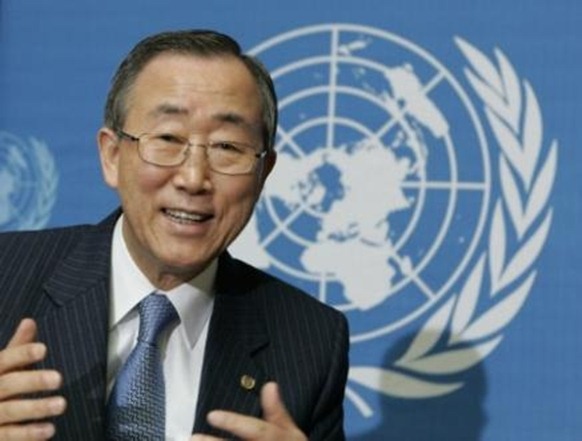 While Secretary General Ban Ki Moon extolled the contributions of the UN’s International Criminal Court (ICC) as an effective instrument to uphold peace, justice and human rights, in a Washington Post article, as UN’s member nations convene Monday in Kampala to formally review the Rome Treaty, Professor Francis A. Boyle criticized Ban for delaying action on establishing accountability for Sri Lanka’s "massacre of about 50,000 Tamils" and urged Ban to "immediately appoint the International War Crimes Committee for Sri Lanka that he had already promised to do several weeks ago."
While Secretary General Ban Ki Moon extolled the contributions of the UN’s International Criminal Court (ICC) as an effective instrument to uphold peace, justice and human rights, in a Washington Post article, as UN’s member nations convene Monday in Kampala to formally review the Rome Treaty, Professor Francis A. Boyle criticized Ban for delaying action on establishing accountability for Sri Lanka’s "massacre of about 50,000 Tamils" and urged Ban to "immediately appoint the International War Crimes Committee for Sri Lanka that he had already promised to do several weeks ago."
Between 31st May and 11 June, the first formal review of the Rome Statute is to take place in Kampala, Uganda. In addition to State parties (signed and ratified Rome treaty), others who have signed and ratified have been invited with observer status. The Secretariat has also invited non-signators to attend without observer status.
In the Saturday edition of Washington Post, Ban said, "[s]o far, the ICC has opened five investigations. Two trials are underway; a third is scheduled to begin in July. Four detainees are in custody. Those who thought the court would be little more than a paper tiger have been proved wrong. To the contrary, the ICC casts an increasingly long shadow. Those who would commit crimes against humanity have clearly come to fear it."
Ban Ki Moon says in the article, "I will do my best to help advance the fight against impunity and usher in the new age of accountability. We must never forget that crimes against humanity are just that — crimes against us all."
Prof. Francis Boyle commented:
- "U.N. Secretary General Ban Ki-Moon is certainly correct in his conclusion that crimes against humanity are "crimes against us all."
"For obvious reasons, the Government of Sri Lanka has refused to become a party to the Rome Statute for the International Criminal Court and thus ipso facto to incriminate itself for the genocidal massacre of about 50,000 Tamils in Vanni a year ago. So that leaves it up to Ban Ki-Moon to "do my best to help advance the fight against impunity and usher in the new age of accountability," as he has just solemnly promised the entire world to do in the pages of the Washington Post. Hence, pursuant to this promise, Ban Ki-Moon must immediately appoint the International War Crimes Committee for Sri Lanka that he had already promised to do several weeks ago.
"Time is of the essence! Evidence is being destroyed. Witnesses are being disappeared. Ethnic cleansing of Tamils in the Tamil Homeland in the North and the East of the Island is already underway."
Commenting on Ban Ki Moon’s statement that "Women, children and the elderly are at the mercy of armies or militias who rape, maim and kill; who devastate towns, villages, crops, cattle and water sources — all as a strategy of war. The more shocking the crime, the more effective it is as a weapon," Professor Boyle said:
- "This is exactly what the GOSL did to about 50,000 Tamils a year ago in Vanni. Right now is the "occasion to strengthen our collective determination that crimes against humanity cannot go unpunished — the better to deter them in the future." In accordance with this his own logic and rationale, Ban Ki-Moon must immediately appoint his proposed International War Crimes Committee for Sri Lanka if he is to have any credibility at all."
The ICC has jurisdiction over only the signatories of the Rome Treaty.
ICC Member States (110) as of 21 July 2009
Non-signatories of Rome Statute
Sri Lanka campaign for Rome ratification
In March this year Bangladesh became the first country in the South Asian sub-region to ratify the Rome Statute becoming the 111th member of the group of Nations to abide by the laws of the International Criminal Court (ICC), and thereby, actively cooperate in areas such as providing evidence of war-crimes and crimes against humanity, surrendering indicted individuals and holding national trials.
Sri Lanka has been refusing to ratify the Rome Statute.
In an 2005 appeal, Bhavani Fonseka, with the Center for Policy Alternatives in Colombo, said, “Sri Lanka’s accession would not only help the whole of Asia to have a stronger voice in the decision-making processes of the ICC, it would also serve as a powerful way to promote peace domestically within Sri Lanka. Sri Lanka has a great tool for sustainable peace in the ICC treaty and acceding to it would signal that the country as a whole accepts the highest standards of human rights that the ICC treaty represents."
Only 7 countries in the Asian continent, Afghanistan, Bangladesh, Cambodia, Mongolia, the Republic of Korea and Timor‐Leste and Japan, have ratified the Rome Statute.
(For updates you can share with your friends, follow TNN on Facebook and Twitter )
